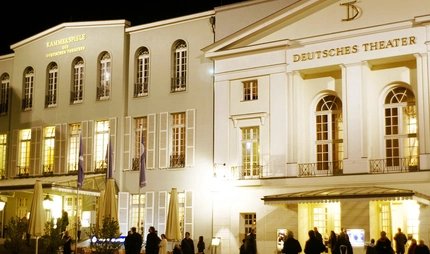
Berliner Ensemble
“Theatre as a moral institution”
The Berliner Ensemble is renowned for its outstanding German-language productions – and a tradition embracing many great names in German theatre!
The impressive auditorium, with its red seating and elaborate decorative carvings, epitomises the best in stage traditions. The third bell rings, the house lights dim and, as the heavy red curtain slowly opens, the audience falls silent. An actor walks out onto stage and pauses briefly – as if savouring the moment before the drama unfolds.
The Berliner Ensemble was established in East Berlin in 1949 by leading playwright, poet and theatre director Bertolt Brecht and his wife, the distinguished actress Helene Weigel. Their artistic and political beliefs fundamentally shaped this ensemble’s traditions. Even today, the repertoire ranges from the great German-language classics – whether Goethe’s famous "Faust" or Lessing’s "Nathan der Weise" – to contemporary works by Heiner Müller or Christa Wolf. Many of the plays have a strong political message, including Brecht’s own works such as the "Kaukasische Kreidekreis" (The Caucasian Chalk Circle) or "Mutter Courage und ihre Kinder" (Mother Courage and her Children). And if you’re wondering why German theatre has such an enviable reputation, then the Berliner Ensemble is a great place to find out! You can regularly choose from up to 15 performances a month, including such classics as:
- Goethe "Die Leiden des jungen Werther"
- Kafka "Der Prozess"
- Schiller "Kabale und Liebe"
Here, you can also see German-language productions of such well-known plays as Shakespeare’s "Was Ihr wollt" (Twelfth Night) or Beckett’s "Warten auf Godot" (Waiting for Godot).
The venue – the Theater am Schiffbauerdamm
From the very start, the Berliner Ensemble was housed in a key venue in the history of the stage, associated with such major figures as Max Reinhardt, Bertolt Brecht, Helene Weigel, Heiner Müller and Claus Peymann. The Theater am Schiffbauerdamm opened in 1893 with the première of Gerhart Hauptmann’s "Die Weber". In 1954, this theatre then became home to the Berliner Ensemble. From 1999 to 2017, the Berliner Ensemble’s artistic director was Claus Peymann. His vision revitalised the Berliner Ensemble as a venue for political theatre, taking as its motto Schiller’s immortal words: “Theatre as a moral institution”. From the 2017|18 season Oliver Reese, former artistic director of the Staatsschauspiel Frankfurt, is the artistic director of the theatre.
Backstage at the Berliner Ensemble
Take a look backstage and in the wings! At open events, the artistic director, stage directors and performers answer questions from the audience, including, for example: Are actors always nervous before each performance? How often do you rehearse a new piece before the première? How do the technical aspects of the performance work? For more details on a particular play, dramatic advisers present a brief talk 45 minutes before the curtain rises, offering an insight into how the play was created.
Information for school classes
The theatre offers reduced tickets for school pupils. Tickets for school pupils cost € 9 for all performances, and as little as € 4.50 for shows marked as selected for schools.
Tip: For a taste of life backstage - and perhaps a chat with one of the actors – why not get the real deal at the Berliner Ensemble canteen? During the daytime, or before or after a show, there’s more on offer than just pea soup or bratwurst – and it even has a small beer garden for summer!
Tickets for the Berliner Ensemble
Box Office
Monday to Friday: 8:00 - 18:00
Saturday and Sunday: 11:00 - 18:00



